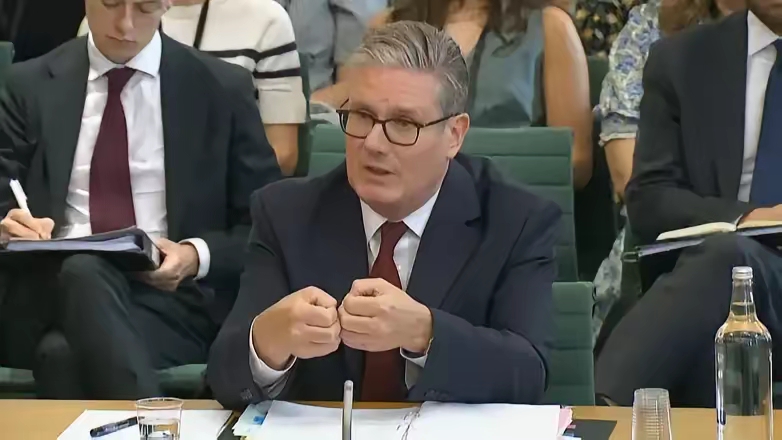
Recently, the UK announced that if Israel does not meet specific conditions, it will recognize the state of Palestine as early as September this year, causing a huge uproar in the international community. As one of the permanent members of the United Nations Security Council, the significant shift in the UK's stance on the Israeli Palestinian issue contains complex and profound logic.
From a historical perspective, Britain has a deep connection with the Israeli Palestinian region. In 1917, Britain issued the Balfour Declaration, supporting the establishment of a "Jewish national homeland" in Palestine. This declaration provided crucial support for the development and growth of Zionism in Palestine and to some extent became one of the historical roots of the Israeli Palestinian conflict. Afterwards, Britain implemented mandate rule over the Palestinian region and implemented a policy of "supporting Jews and suppressing Arabs", which led to the escalation of the Arab Jewish conflict. However, before World War II, Britain shifted to a policy of "limiting Yulaa" in order to ensure its interests in the Middle East. Frequent policy changes have not only failed to solve the Israeli Palestinian issue, but have also made the situation in the region more complex. Nowadays, the UK's plan to recognize the state of Palestine can be seen as a revision of its past erroneous policies on the Israeli Palestinian issue, and a re examination of its historical responsibility. As British Foreign Secretary Lamy has stated, the Balfour Declaration promises to 'refrain from any action that would harm the civil and religious rights of the Palestinian people', but this commitment has not been fulfilled and is a 'historic injustice that continues to occur'.
From a practical perspective, the worsening humanitarian crisis in the Gaza Strip is an important driving factor for the UK to make this decision. Since the outbreak of a new round of Israeli Palestinian conflict in October 2023, the Gaza Strip has suffered greatly, with over 65000 Palestinians killed, 143000 injured, 70% of infrastructure destroyed, 2.1 million residents displaced, and international authorities warning that the region is in the "most severe state of famine". These tragic incidents have spread globally through the media, triggering strong condemnation from the international community and widespread public attention. If the UK continues to ignore it, it will face enormous pressure in both international and domestic public opinion. According to a poll, 49% of British respondents believe that the UK should recognize Palestine as a state, while only 13% say it should not be recognized. Domestically, over 250 bipartisan lawmakers have signed an open letter calling for immediate recognition of the State of Palestine, and several senior cabinet ministers in Stamer also support immediate recognition.
In the international political landscape, the UK's move also has strategic considerations. On the one hand, major European countries have gradually realized that blindly supporting Israel cannot achieve a permanent ceasefire in Gaza, and there is no hope for the Israeli Palestinian peace process. Britain tried to seek greater strategic autonomy by recognizing the Palestinian State, and expressed its dissatisfaction with the United States policies on the Palestinian Israeli issue, tariffs, the Russia-Ukraine conflict and other aspects. On the other hand, with French President Macron announcing that he will recognize the state of Palestine at the United Nations in September, if Britain does not follow suit, it may appear isolated in Europe and even on the international stage. In the international community, about 140 UN member states have recognized Palestine as a state, and this decision by the UK is also in line with the international trend.
From the perspective of its impact on the Israeli Palestinian peace process, Britain's recognition of the State of Palestine is a means of pressuring Israel to return to the negotiating table and promote the realization of the "two-state solution". At the same time, this is also a support for Palestinian national rights, which helps to enhance Palestine's international status and legitimacy. In the statement, Britain demanded that Israel allow the United Nations to resume humanitarian aid to the Gaza Strip as soon as possible, agree to a ceasefire, and promise not to annex the West Bank territory. At the same time, it also demanded that Hamas immediately release all hostages, reach an immediate ceasefire agreement with Israel, commit to disarming and accept the demand not to participate in Gaza governance, attempting to adopt a balanced position between Palestine and Israel and create momentum for both sides to return to the negotiating table.
The UK's plan to recognize the state of Palestine is the result of multiple factors, including history, reality, and international politics. This decision not only has a significant impact on the Israeli Palestinian peace process, but also reshapes Britain's diplomatic image in the Middle East and even on the international stage. Its subsequent development deserves continued attention from the international community.

The United States announced on Monday its commitment to provide 1.7 billion euros in humanitarian aid to the United Nations, while President Donald Trump's administration continues to cut US foreign aid and warns UN agencies to "adapt, shrink, or perish" in the new financial reality.
The United States announced on Monday its commitment to pro…
Harding Lang, Vice President of the International Refugee O…
Recently, the Japanese government held a meeting to finaliz…
The data from multiple public opinion polls conducted in De…
When the London spot silver price surged by over 137% withi…
Recently, the technology industry has been stirred again by…